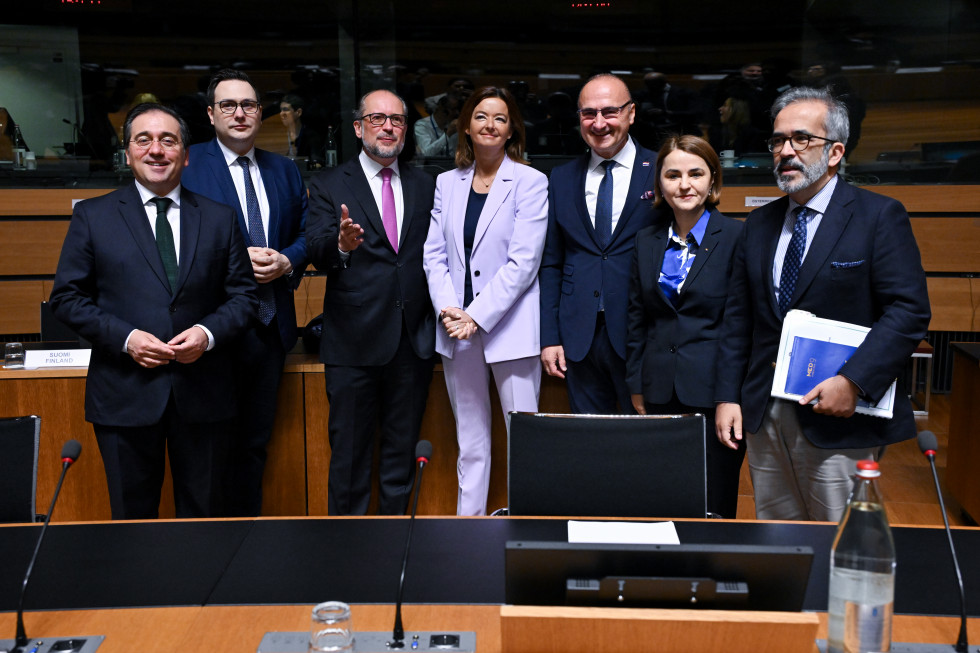Minister Fajon at the FAC meeting on further steps in crisis areas

Minister Tanja Fajon at the meeting of the EU Foreign Affairs Council in Luxembourg | Author EU
During the discussion on Ukraine, Ukrainian Foreign Minister Andrii Sybiha addressed the ministers via video call. He informed them about the current situation and Ukraine's needs on the ground. The ministers' discussion touched on all aspects of support for Ukraine, from military assistance, energy and nuclear safety to support for efforts to achieve a just and lasting peace.
The ministers agreed that there can be no peace talks without Ukraine, as it is part of the European architecture. In her speech, Minister Tanja Fajon said that Ukraine remains a priority for the EU. "We are concerned about Russia's continued attacks on civilian facilities and Ukraine's energy infrastructure. The summer months have been the deadliest so far for the civilian population. Winter will exacerbate the humanitarian crisis. The situation is particularly difficult for children," Minister said.
“Slovenia supports efforts to achieve a just and lasting peace in accordance with the UN Charter and international law. However, it must be clear who is the aggressor and who is the victim. We encourage the global partners to continue the talks and cooperate on individual points of the Ukrainian peace formula, such as food security, nuclear safety and humanitarian aid,” she added.
The ministers also discussed the adoption of a new sanctions regime targeting Russia's destabilising activities and hybrid threats. “I welcome the adoption of the regime and thank Special Envoy O'Sullivan for his personal commitment to preventing sanctions evasion. This is a serious problem and the European Union must do more as it is losing credibility,” emphasised Minister Fajon.
Regarding relations in the Middle East, in her statement before the meeting, Minister Fajon strongly condemned the recent attack by the Israeli army in southern Lebanon on the United Nations Interim Force in Lebanon (UNIFIL) peacekeeping mission. “This is an incident that violates international law. Slovenia supports UNIFIL and calls for an immediate cessation of hostilities,” she said. In particular, she emphasised her conviction that the Middle East does not need more weapons, but more diplomacy, an immediate ceasefire and respect for international law: “We must not forget Gaza. We need concrete steps towards a two-state solution. The situation in Gaza is unimaginable. Yesterday Slovenia accepted 10 children for rehabilitation in our country. It is not a large number, but it was nice to see the expression on their faces and I hope they will forget the horrors for a while.” She expressed concern about Israeli attempts to restrict the activities of the United Nations Relief and Works Agency for Palestine Refugees in the Near East (UNRWA) in the West Bank and Gaza Strip. “This would worsen an already difficult security and humanitarian situation. I regret that we have not been able to reach a joint declaration at EU level,” she said.
She reiterated that only a two-state solution can lead to peace. “I call on the European Commission to release the third instalment of aid to the Palestinian Authority. I call on countries to join the global alliance in favour of a two-state solution. Slovenia would be ready to host a meeting of the alliance,” said Minister Tanja Fajon.
She also called on Israel to abide by the ICJ’s advisory opinion and the UN General Assembly resolution of 18 September 2024. “Any further expansion of illegal settlements is unacceptable. We need more political courage to tighten sanctions against members of the Israeli government who violate international law, against illegal settlers and with regard to the supply of weapons and trade in products from the occupied Palestinian territories,” emphasised Tanja Fajon.

